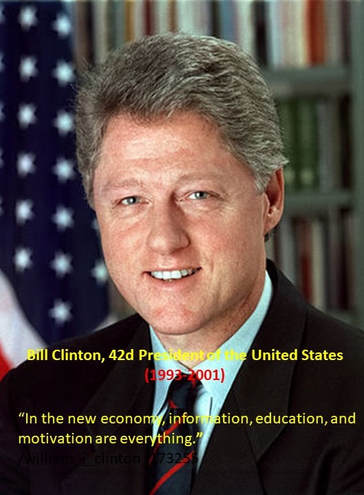
Bill Clinton was the first president since Woodrow Wilson to take office in a world where there was no Soviet Union. That entity, the communist government that resulted from the Russian Revolution, collapsed in 1989, and the United States was left as the pre-eminent global superpower. This fact allowed the US government to cut military spending--the largest single piece of the discretionary budget--by about a third during the Clinton presidency. That is not to say the military was idle during Clinton's presidency: there was an ongoing operation to enforce no-fly zones over significant areas of Iraq, a deployment to Somalia to rescue a failed state that brought American forces into direct combat against the kind of unconventional adversaries that we have been fighting ever since, and deployments to the Balkans to stabilize areas where the vacuum created by the Soviet collapse led to civil war and genocide. That said, the absence of a peer competitor took some pressure off the budget. By the end of Clinton's second term, the Congressional Budget Office had reported three years in a row with a budget surplus. Before 1998, the last budget with a surplus had been 30 years previously--in 1969.
Clinton's second term was consumed with a scandal stemming from sexual misconduct by the president with a young intern named Monica Lewinsky. in 1998, Clinton was impeached by the House of Representatives and tried by the Senate for charges of perjury and obstruction of justice. After a 21-day trial, Clinton was acquitted on both charges because the Senate could not reach the two-thirds majority required to convict and remove and office holder. The final votes were close and largely decided along party lines.
Throughout all of this controversy, the economy was largely a good-news story during the Clinton years. The private sector was consumed with the explosion of information technology and the need to patch systems to prevent a serious interruption at the turn of the century--the so-called Y2K problem. There was a bit of a downturn at the end of Clinton's presidency as a bubble of tech company stocks burst, but otherwise the Clinton economy was a strong economy.
Finally, there was a steady drumbeat of terrorist attacks during the Clinton presidency. Many of these attacks were linked to a terrorist group known as al Qaeda. There was a first attempt to destroy the World Trade Center with a truck bomb in 1993 that killed several Americans, followed by a bombing of US barracks in Saudi Arabia, a bombing of our embassies in Africa, a bombing of the USS Cole that killed seventeen sailors, and an assassination attempt against Clinton in the Phillipines that has only recently been made public.
In general, despite the positive economy, the Clinton presidency was accompanied by an increased level of partisanship that has been a factor in the American political scene ever since.*
*This is my observation. Do you agree? Please comment. In any event, it is an observed correlation. I do not know if there is a causal connection. Do you remember the difference between correlation and causation?

 RSS Feed
RSS Feed
